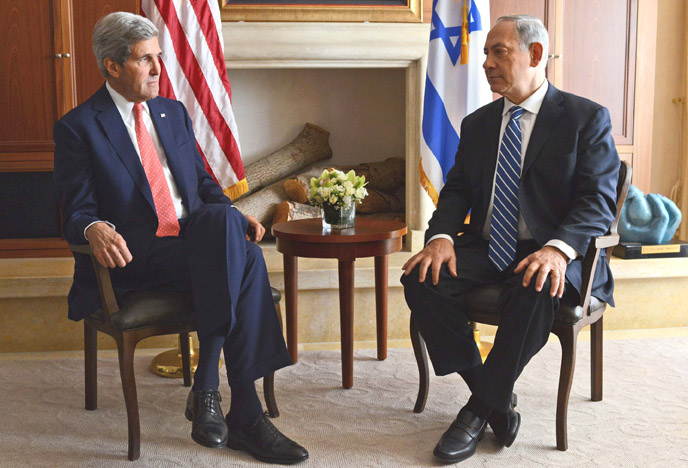Australia/Israel Review
A Friendly Disagreement
Nov 21, 2013 | Amos Yadlin

The dispute between Israel and the United States on the Iranian nuclear challenge emerged this week from behind closed doors and became an open conflict waged on television.
Israel and the US share the strategic goal of preventing Iran’s attainment of nuclear weapons. Both countries agree that only two forms of leverage can block Iran’s dash to the bomb – economic sanctions and a credible military threat. However, Israel and the US diverge in their assessments as to the scope and timing for effective use of these levers. Consequently, there is a huge gap between them on how to reach the goal of stopping Iran’s military nuclear program, which strategy is appropriate at this time, and what lies beyond the initial agreement that may be reached in the next round of talks on November 20.
Indeed, what is on the agenda of the Geneva talks is “an initial agreement”, and not the “final, comprehensive agreement” that must be reached following an additional six months of negotiations.
The US sees the initial agreement as a prelude to serious negotiations on the final agreement and a test of Iran’s new behaviour following the election of new Iranian President Rouhani. It ascribes much importance to the change in atmosphere and to the encouragement of the “moderate” forces in Iran. There is also an achievement in the very delay in Iran’s nuclear progress, the first since 2003. The US sees the alternative to an initial agreement as Iran’s continued progress toward nuclear weapons. According to senior administration officials, the US will pay a low price in easing sanctions, and the sanctions lever will remain intact even after they are lightened: the principal sanctions on oil exports and the financial sector will remain in effect and will continue to exert significant pressure until formulation of the final agreement.
Israel, however, deems this American reasoning as dangerous and misguided. Jerusalem believes that the US is eager to reach an agreement at almost any price, and as such is prepared to forfeit the historic opportunity of realising the potential of the heavy sanctions that were imposed on Iran over the past year. Israel believes that the relaxed sanctions are significant, will translate into less pressure on Iran, and may even lead to the dissolution of the sanctions regime altogether, since many companies will rush to do business with Iran.
Most of all is the concern that the US will be left with no cards to play when trying to draft a final agreement. Israel is deeply concerned that the P5+1 will not reach any final agreement at the end of six months. Iran, relieved of the pressure of the main sanctions, will resume full nuclear activity on all levels – uranium enrichment to at least 20 percent, if not more; the addition of thousands of advanced centrifuges; operation of the Arak reactor; and advancement of components of the weapons program.
Careful analysis of the American stance gives rise to Israel’s very real concern that the US will not be prepared to leverage the full weight of the options available to it should the talks fail six months down the line. It is unlikely the US would acknowledge failure of the talks if a final agreement is not reached, and there is cause for concern that the initial agreement will become a permanent agreement. This would indeed constitute a bad deal. Admitting a failure of the talks would mean choosing between a military option – which is far removed from the current US agenda – and harsher sanctions, which the US fears will push Iran to a nuclear breakout. Fears of a third conflict in the Middle East, the trauma of the long and unsuccessful wars in Iraq and Afghanistan, and the lack of confidence as to a focused, surgical aerial campaign have diluted any credible military option. Common discourse in Washington is, “Since a military strike will in any event lead to diplomacy, we should move straight to the negotiations table,” and “a military strike can only delay but cannot eliminate the military nuclear program.” This rhetoric heightens the sense in Israel that little remains of a credible US military option, and that ultimately a nuclear Iran will be a fait accompli, managed by a strategy of containment and deterrence.
If this lack of trust between Israel and the US continues and the credibility of the US diplomatic leverage continues to erode, an Israeli military option – as the only possible response to the Iranian nuclear challenge – will become relevant once again.
To achieve their common goal of preventing Iran’s nuclearisation, strategic and tactical coordination between the US and Israel must resume. Confidence must be restored at all levels, from the leaderships to the senior echelons to the ministerial levels. Seven measures can contribute to this.
First, the US and Israel must move past the dispute regarding the initial agreement. The US must clarify to Israel what concessions on the sanctions are the subject of deliberation, and if they depart significantly from what has been presented to Israel thus far. The mutual accusations as to what Israel really knows about the agreement are not constructive and do not contribute to a serious discussion about the final agreement. Transparency toward Israel and inclusion of Israel in the details of the negotiation will help transfer the discussion from the newsrooms back to the offices of the decision makers and classified channels of communication. It must be confirmed that the initial agreement must at the very least guarantee: the conversion of all the uranium enriched to 20 percent, so that it cannot allow a nuclear breakout; a stop to the building of the Arak reactor; non-activation of the advanced centrifuges; and more stringent verification as prescribed by the Additional Protocol. Without these elements the talk of “stopping Iran’s nuclear clock” has no meaning.
Second, the relaxed sanctions must be reversible, cannot undermine the sanctions regime, and must not weaken the principal form of leverage that can induce a future change of Iranian strategy.
Third, the US must underscore that the initial agreement does not legitimise Iran’s nuclear program. Israel fears that recognising Iranian nuclear activity constitutes a retreat from the demands of the international community stipulated in UNSCR 1737, namely, that Iran must immediately suspend all nuclear activity.
Fourth, the US must emphasise that the initial agreement is valid for six months only, and the process will not continue indefinitely. Washington and Jerusalem must define the parameters for “success” and “failure” regarding a final agreement. It is important that both countries be on the same page vis-à-vis the seven principal issues of a final agreement: the enrichment level of the uranium program; the number of centrifuges; the material to be removed from Iran; the Fordow facility; non-activation of the Arak reactor; future intrusive inspection of the program; and closure of the files that remain open concerning the weapons program. It is important to agree on what constitutes a good deal, a reasonable deal, or a bad deal.
Fifth, Israel and the US would do well to come to some agreement on Plan B – should an initial agreement not be reached; should Iran violate the initial agreement; or should a final agreement not be reached following an additional six months of negotiations.
Sixth, the US must reiterate and lend credibility to the statement that “all options are on the table.” The “art of war” is the achievement of strategic objectives with a minimum of time, risk, and resources. Threat of US military capabilities, which are the world’s most impressive military tools, may eventually eliminate the need to use them. In order to strengthen the threat, the US must demonstrate its intention with actions, not just words (which in any case have been sorely weakened in recent months) that a military option is eminently credible and relevant.
Seventh, the US must clarify that failure of the talks will prompt another round of sanctions. US determination to tighten the sanctions must also be evident, and Congress could indeed pass additional sanctions pending the failure of the negotiations.
In conclusion: the US and Israel, along with the other powers and many Arab states, share a clear national interest to deny Iran the ability to produce nuclear weapons. It is very important to maintain the cooperation and coordination in advance of the discussions on the final agreement, and not undermine the trust during the initial agreement phase. Faith and mutual understanding between the US and Israel must be restored, and there must be agreement on what constitutes a reasonable final agreement. The US would do well to promise that an initial agreement will not become the final agreement, which would allow Iran to retain all its nuclear capabilities and be able to undertake a quick breakout to the bomb. Increased credible determination on the part of the US and the international powers to use all the means at their disposal to stop Iran’s nuclear program is a prerequisite for success in future negotiations on a final agreement with Iran.
Maj. Gen. (ret.) Amos Yadlin is Director of Tel Aviv University’s Institute for National Security Studies (INSS). Previously he served as the IDF’s Chief of Defence Intelligence as part of his 40 years of service in the Israeli military. © INSS, reprinted by permission, all rights reserved.
Tags: Iran






